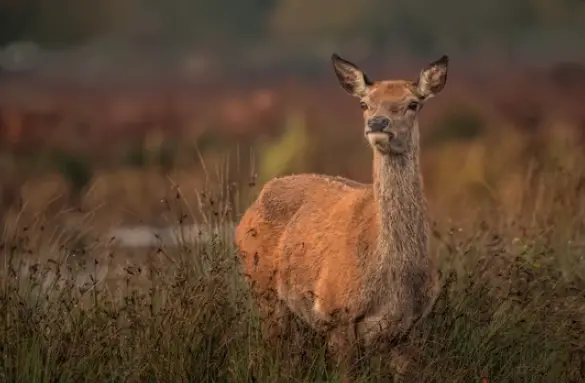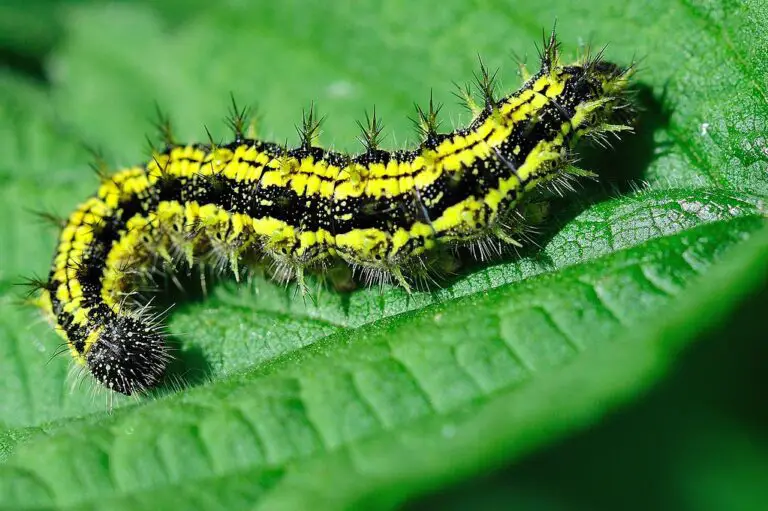Keeping Deer Out of Vegetable Garden: Effective Strategies
Deer can be a major problem for vegetable gardeners.
They are notorious for eating crops and damaging plants, leaving gardeners frustrated and disappointed.
However, there are several effective ways to keep deer out of your garden and protect your hard work.
One of the most common ways to keep deer out of a garden is to install a fence.
A fence can be an effective barrier to keep deer from entering your garden and damaging your crops. However, it is important to choose the right type of fence and install it properly.
Deer are excellent jumpers, so a fence that is too low or too easy to climb may not be effective. A fence that is at least 8 feet tall and made of sturdy materials, such as metal or wood, is recommended.
It is also important to bury the fence at least 6 inches deep to prevent deer from digging underneath it.
Another effective way to keep deer out of your garden is to use repellents.
There are several types of repellents available, including sprays, granules, and electronic devices. Repellents work by emitting a scent or sound that deer find unpleasant or frightening.
Some repellents are made with natural ingredients, while others contain chemicals.
It is important to choose a repellent that is safe for your crops and the environment, and to follow the instructions carefully.
Understanding Deer Behavior
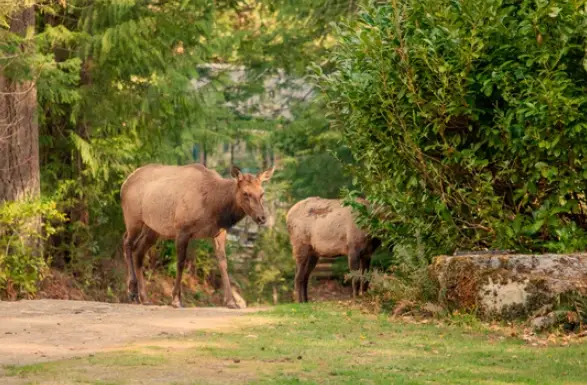
Deer are majestic creatures that can cause significant damage to vegetable gardens if not properly managed. Understanding their behavior is key to keeping them out of your garden.
Deer Feeding Habits
Deer are herbivores and will eat a variety of plants. They prefer tender shoots and leaves, but will also eat bark, fruits, and nuts. They have a particular fondness for plants that are high in protein and carbohydrates, such as soybeans, peas, and corn.
Deer are most active during the early morning and late evening hours. They have a keen sense of smell and can detect food from a distance. They are also excellent jumpers and can easily clear fences up to 8 feet high.
Deer Attraction to Vegetable Gardens
Deer are attracted to vegetable gardens because they provide a source of fresh, nutritious food. They are also attracted to the scent of plants that have been recently watered or fertilized.
To prevent deer from being attracted to your garden, it is important to keep it clean and free of debris. This includes removing fallen fruit, dead leaves, and other organic matter that can attract deer.
In addition, it is important to avoid planting crops that are particularly attractive to deer. These include soybeans, peas, and corn. Instead, consider planting crops that are less attractive to deer, such as tomatoes, peppers, and squash.
Finally, it is important to use physical barriers to keep deer out of your garden. This can include erecting fences that are at least 8 feet high, or using netting or other barriers to protect individual plants.
Keeping Deer Out of Vegetable Garden
Physical Barriers
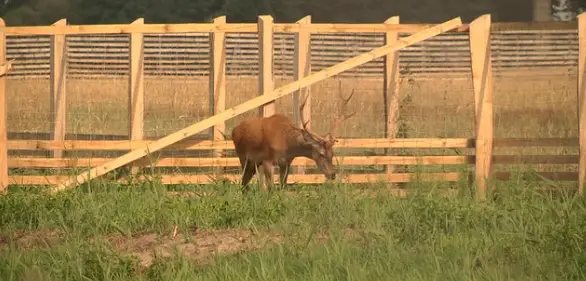
When it comes to keeping deer out of a vegetable garden, physical barriers are the most effective solution. There are different types of physical barriers available, including fencing and netting.
Fencing
Fencing is the most popular and effective method to keep deer out of a garden. The fence should be at least 8 feet tall to prevent the deer from jumping over. The fence should also be buried at least 6 inches deep to prevent the deer from digging under it. The fence should be made of a sturdy material, such as metal or wood, to prevent the deer from breaking through it.
There are different types of fences available, including electric fences, mesh fences, and slatted fences. Electric fences are effective but require a power source. Mesh fences are less expensive but can be difficult to install. Slatted fences are aesthetically pleasing but may not be as effective as other types of fences.
Netting
Netting is another physical barrier that can be used to keep deer out of a vegetable garden. Netting should be at least 7 feet tall to prevent the deer from jumping over it. The netting should also be anchored to the ground to prevent the deer from crawling under it.
There are different types of netting available, including plastic netting and wire mesh netting. Plastic netting is less expensive but may not be as durable as wire mesh netting. Wire mesh netting is more expensive but is more durable and can last for several years.
It is important to note that physical barriers may not be effective in all situations. If the deer population is high in the area, they may find a way to get around the barrier. In such cases, it may be necessary to use other methods, such as deer repellents or scare tactics.
Using Deer Deterrents
Deer can be deterred from entering a vegetable garden by using commercial or homemade repellents.
Commercial Repellents
There are several commercial deer repellents available in the market that can be sprayed on plants or around the garden to keep deer away. These repellents contain various natural or synthetic ingredients that give off odors that are unpleasant to deer. One of the most effective ingredients in commercial deer repellents is the urine of predators like wolves and coyotes. The scent of predator urine signals to deer that there is danger in the area and they should stay away. Some commercial repellents also contain capsaicin, the active ingredient in chili peppers, which can irritate the deer’s sense of smell and taste.
It is important to note that commercial repellents may need to be reapplied after rainfall or every few weeks to remain effective. Additionally, some commercial repellents may not be suitable for use on edible plants, so it is important to read the label carefully before use.
Homemade Repellents
There are several homemade deer repellents that can be made using common household items. One popular recipe involves combining one egg, one tablespoon of cooking oil, one tablespoon of dish soap, and one cup of milk in a spray bottle. The mixture can be sprayed on plants or around the garden to keep deer away. Another recipe involves simmering a pinch of red pepper flakes in a pan of water, then straining the liquid into a spray bottle. The spicy scent of the pepper flakes is unpleasant to deer and can deter them from entering the garden.
Other homemade repellents include hanging bars of soap or bags of human hair around the garden, as the scent of soap or human hair can be unpleasant to deer. Some gardeners also use scarecrows or shiny objects like CDs or aluminum foil to scare deer away.
It is important to note that homemade repellents may need to be reapplied more frequently than commercial repellents and may not be as effective. Additionally, some homemade repellents may not be suitable for use on edible plants, so it is important to research and test any homemade repellents before use.
Plant Selection and Placement
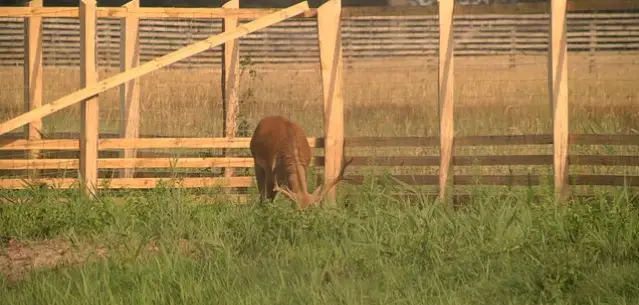
Deer-Resistant Plants
When selecting plants for a vegetable garden, it is important to choose deer-resistant varieties. While no plant is completely deer-proof, some plants are less appealing to deer than others. Some examples of deer-resistant plants include:
- Herbs: rosemary, thyme, lavender, oregano, and sage
- Vegetables: tomatoes, peppers, eggplants, and cucumbers
- Flowers: daffodils, alliums, marigolds, and zinnias
It is important to note that deer-resistant plants may vary depending on the region and the specific deer population. Gardeners should research the deer-resistant plants that are best suited for their area.
Strategic Plant Placement
In addition to selecting deer-resistant plants, gardeners can also strategically place plants to deter deer. For example, planting strong-smelling herbs and flowers around the perimeter of the garden can help mask the scent of the vegetables and make it less appealing to deer.
Another strategy is to plant vegetables that deer tend to avoid, such as those with a strong taste or smell. For example, planting onions, garlic, or hot peppers can help deter deer from the garden.
Gardeners can also use physical barriers, such as fencing or netting, to keep deer out of the garden. However, it is important to note that fencing must be at least 8 feet tall to be effective, as deer are skilled jumpers.
By selecting deer-resistant plants and strategically placing them in the garden, gardeners can help protect their vegetables from deer damage.
Other Preventive Measures

Using Deer Decoys
One way to keep deer away from the vegetable garden is by using deer decoys. Placing a deer decoy in the garden can trick deer into thinking that there is already a deer in the area, which can deter them from entering. It is important to move the decoy around the garden periodically to make it appear more realistic. However, it is worth noting that this method may not be effective for long periods of time as deer can eventually become accustomed to the decoy.
Garden Layout
The layout of the garden can also play a role in deterring deer. Planting vegetables that deer do not like to eat, such as tomatoes, onions, or peppers, can help prevent deer from entering the garden. Additionally, planting vegetables in raised beds or containers can make it more difficult for deer to access them. Using trellises or other vertical structures can also be effective as deer are not avid climbers.
Another option is to create a barrier around the garden using plants or other materials that deer do not like. For example, planting a border of lavender, mint, or garlic can help mask the scent of the vegetables in the garden. Deer also dislike picking their way through bushes with thorns, so planting thorny shrubs such as holly or barberry around the garden can also be effective.
In conclusion, there are various preventive measures that can be taken to keep deer out of the vegetable garden. Using deer decoys and designing the garden layout to deter deer can be effective methods to protect the garden.
Conclusion
In conclusion, there are multiple ways to keep deer out of a vegetable garden. One effective method is to install a fence around the garden. A permanent fence made of sturdy materials is the best option, but a temporary fence made of metal stakes and wire fencing can also work well.
Another option is to plant deer-resistant vegetables and herbs, such as onions, garlic, and chives, which have strong smells and tastes that deer dislike. Additionally, using deer-repellent sprays or motion-activated sprinklers can deter deer from entering the garden.
Creating a barrier with plants, such as planting thorny or prickly bushes around the garden, can also help keep deer out. Using repellent plants, such as yarrow or lavender, can mask the scent of the sought-after plants in the garden.
Keeping the garden clean and free of fallen fruit or vegetable scraps can reduce the attraction of deer to the area. Creating noise or using scare tactics, such as hanging reflective tape or placing scarecrows in the garden, can also deter deer from entering.
Overall, it is important to understand deer behavior and the size of the area being protected in order to choose the most effective method for keeping deer out of a vegetable garden. By using a combination of these methods, gardeners can successfully protect their crops from deer damage.
Frequently Asked Questions
What is the most effective deer repellent?
There are several deer repellents available in the market, including chemical sprays, electronic devices, and natural remedies. However, there is no single most effective deer repellent that works for everyone. Some people have success with one method, while others find that a different method works better for them. It is best to try a few different methods to find out what works best for your situation.
How do farmers keep deer away from their crops?
Farmers use a combination of methods to keep deer away from their crops. These methods include fencing, scare tactics, and repellents. Some farmers also use hunting as a way to control the deer population.
What keeps deer out of a vegetable garden?
The most effective way to keep deer out of a vegetable garden is to install a physical barrier, such as a fence. The fence should be at least 8 feet tall and made of a material that deer cannot easily jump over or push through. Additionally, planting deer-resistant plants and using natural deer repellents can help keep deer away from the garden.
Will a 6-foot fence keep deer out of a garden?
A 6-foot fence may not be enough to keep deer out of a garden. Deer are excellent jumpers and can easily clear a 6-foot fence. It is recommended to install a fence that is at least 8 feet tall to effectively keep deer out of a garden.
How can you make a deer-resistant vegetable garden?
To make a deer-resistant vegetable garden, plant vegetables that deer do not like to eat, such as tomatoes, peppers, and squash. Additionally, use natural deer repellents, such as human hair or soap, to keep deer away from the garden. Planting a physical barrier of deer-resistant plants around the garden can also help keep deer away.
What smells do deer hate the most?
Deer are repelled by strong smells, such as human hair, soap, and garlic. Other smells that deer hate include mothballs, blood meal, and vinegar. Using these natural repellents around a garden can help keep deer away.

